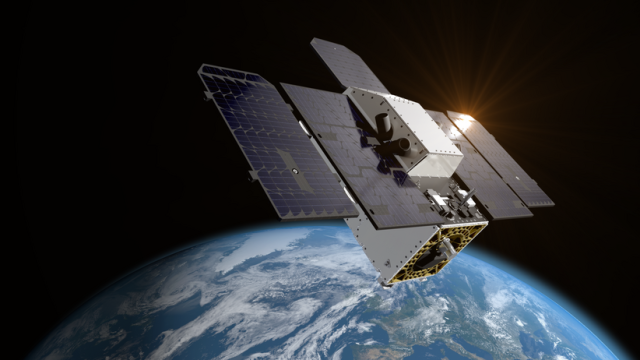The National Security Council is having to respond to comments made earlier this week by a senior Russian foreign ministry official who warned that commercial satellites operated by the U.S. and its allies, if used to support the Ukrainian war effort, could become legitimate targets.
Konstantin Vorontsov, deputy director of the Russian foreign ministry’s department for non-proliferation and arms control, made the comments while speaking to the United Nations First Committee on Wednesday, October 26, Reuters reports.
“I would like to draw special attention to the extremely dangerous tendency, which has surfaced in the course of the developments in Ukraine. I mean the use of outer space civil infrastructure facilities, including commercial ones, in armed conflicts by the United States and its allies,” Vorontsov said, as quoted by Russian state news agency TASS. “Quasi-civil infrastructure may be a legitimate target for a retaliation strike.”
Russia has the means to shoot down individual satellites, and it demonstrated this capacity in 2021 by deliberately destroying one of its own satellites. Anti-satellite, or ASAT, tests are a form of saber rattling, but they’re quite dangerous, producing thousands of debris fragments that remain stuck in low orbit for years.
“I would just say that any attack on U.S. infrastructure will be met with a response and will be met with a response appropriate to the threat that’s posed to our infrastructure,” U.S. National Security Council communications director John Kirby told reporters yesterday. As to what that response might look like or whether services provided by private satellites qualify as “U.S. infrastructure” remains unclear.
Vorontsov didn’t name names, but an obvious potential target for Russia is SpaceX’s Starlink satellite constellation, which is providing internet to Ukraine at no cost. Other targets could include Earth-observing satellites managed by Planet Labs and Maxar, which U.S. defence and intelligence agencies have been using to track developments on the ground.
Elon Musk claims that Starlink services have not received funding from the U.S. Department of Defence and that the company is losing around $US20 ($28) million each month for these unpaid costs. The SpaceX CEO says these are “good deeds,” and that the company will continue to make Starlink freely accessible in Ukraine.
That U.S. commercial satellites might be targeted and shot down by Russian ASAT weapons is a real concern. The Space Force is not set up to defend private space-based assets, but experts believe this newest branch of the U.S. Armed Forces might eventually have to do just that. Regardless, Vorontsov’s comments will be of concern to private satellite operators, who aren’t really protected at the moment.
As to whether Russia could actually disable Starlink is another matter entirely. The internet constellation, currently consisting of 3,184 satellites, is highly resilient and immune to many forms of attack, such as signal jamming. What’s more, Russia would have to knock out hundreds of satellites to truly weaken the constellation, in which the interconnected satellites form a “net” in low Earth orbit and beam data down to designated ground receivers. And in the event that Russia knocks out a few Starlink units, SpaceX could easily launch new ones to replace lost units.
China, which sees Starlink as a threat to its national security, is openly developing methods to destroy Musk’s satellite constellation, including the use of nuclear weapons.
The U.S. is currently working under a self-imposed ban on the use of anti-satellite weapons, and several countries have followed suit, including the United Kingdom, Canada, New Zealand, Japan, Germany, the Republic of Korea, and, most recently, Australia.
More: SpaceX Usurps Boeing as NASA’s Second-Biggest Private Partner.
